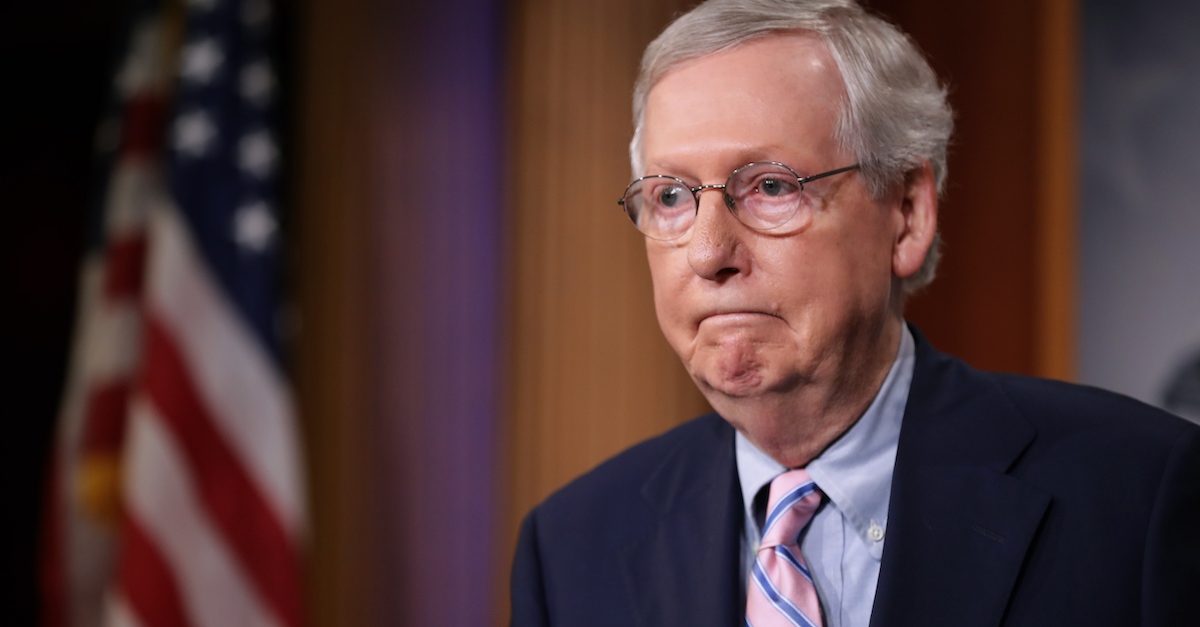
To the collective horror of many but to the valid surprise of no one, Senate Majority Leader Mitch McConnell (R-Ky.) imposed severe and unheard of restrictions on the press during the upcoming impeachment trial of President Donald Trump.
Now, nearly 20 First Amendment and pro-transparency organizations are pushing back. In a four-page open letter released Friday morning and addressed to McConnell and Minority Leader Chuck Schumer (D-N.Y.), advocates for openness and press freedom castigated the GOP-led Senate’s efforts to minimize the media imprint of the impeachment proceedings.
Led by the American Civil Liberties Union (ACLU) the letter begins by calling attention to McConnell’s highly controversial efforts:
The proposal – reported by multiple media outlets but not published online by the Senate for public inspection – would reportedly restrict the movements of the press to a “pen,” install a magnetometer, and limit journalists from using electronic devices to report on the trial from the gallery.
The letter goes on to strike at McConnell’s much-criticized plans for secrecy with a plea for technological innovation instead of what are perceived as measures of a bygone era.
“The Senate should abandon installing magnetometers and embrace the affordances of modern technology to empower journalists to inform the hundreds of millions of Americans distributed across our nation about a matter of the greatest public interest in this young millennium,” the organizations counsel.
Instead of such innovations, there will be one camera there to document—and zero outside photographers of any sort will be allowed.
Their letter also offers a brief history lesson:
In the 225 years since the Senate opened public galleries, the arc of public access to its proceedings has bent towards openness, despite attempts by some to restrict the rights of the people to know what our representatives were doing on our behalf.
In fact, for six years after it first convened in 1789, the Senate was deliberately opaque. While the nation’s “greatest deliberative body” published a weekly journal with a list of votes and summary of activity, the public were unable to enter the chamber and view the proceedings.
“The Senate has made great strides in increasing press freedom since it first opened galleries to the public in 1795, from creating the first press galleries in 1841 to the first television broadcast in 1974 to the first live broadcasts from C-SPAN in 1986 to the launch of Senate.gov in 1995 to livestreams from the floor today,” the letter continues—documenting something of a decided backslide on innovation and access.
Concerns over McConnell’s decision were previously echoed by at least one member of his own party. Sen. John Kennedy (R-La.) said those restrictions send the “wrong message.”
“It’s a huge mistake,” Kennedy told Politico. “U.S. senators are grown women and grown men. If they don’t want to make a comment, they know how to say ‘no comment.’ … We aren’t children.”
But that message has come across loud and clear—and the pro-transparency coalition included a basic case for public and press access commensurate with the nature of the 45th president’s trial.
“While congressional proceedings should be open to the public as a matter of general principle, the public interest value of transparency in an impeachment trial supersedes all others,” the letter notes. “As is true in legislatures and courts across the country, public access can be preserved without unduly restricting the movement of the press by adding cameras and allowing reporters to use laptops and smartphones. Indeed, when in doubt, a presumption of openness should prevail.”
The solution, however, doesn’t require much technical wizardry, according to the groups. All it would take, they argue, is a return to recent (as in last week’s) norms.
“Instead of imposing restrictions on the nation’s greatest deliberative body that seek to go back to the 20th Century, the Senate should be using modern technologies to enable every American to arm themselves with knowledge about how our representatives are upholding their oaths to be fair and impartial jurors in one of the most momentous proceedings in our nation’s history,” the open letter reads. “The public and the press should be empowered to bear witness to history from the galleries. C-SPAN should be allowed into the Senate Chamber to position its cameras so that they can broadcast the historic proceedings throughout the country and make the archives available to the public.”
[image via Chip Somodevilla/Getty Images]